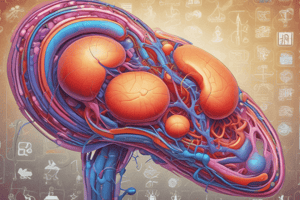Podcast
Questions and Answers
What is the primary role of aldosterone in the body?
What is the primary role of aldosterone in the body?
- Excreting carbon dioxide
- Stimulating thirst mechanisms
- Promoting sodium and water retention (correct)
- Increasing blood acidity
How do the lungs contribute to fluid balance during respiration?
How do the lungs contribute to fluid balance during respiration?
- By promoting aldosterone release
- By excreting moisture during exhalation (correct)
- By retaining sodium
- By increasing blood pressure
In response to low sodium levels, which hormone is secreted by the adrenal cortex?
In response to low sodium levels, which hormone is secreted by the adrenal cortex?
- Angiotensin II
- Cortisol
- Renin
- Aldosterone (correct)
What is the consequence of increased respiratory rate in terms of fluid balance?
What is the consequence of increased respiratory rate in terms of fluid balance?
How does the Renin-Angiotensin-Aldosterone System (RAAS) influence blood pressure?
How does the Renin-Angiotensin-Aldosterone System (RAAS) influence blood pressure?
Which physiological change might trigger the thirst mechanism?
Which physiological change might trigger the thirst mechanism?
What role do the lungs play in acid-base balance?
What role do the lungs play in acid-base balance?
What can lead to hypovolemic shock in the context of fluid balance?
What can lead to hypovolemic shock in the context of fluid balance?
What is the primary regulator of water intake in the body?
What is the primary regulator of water intake in the body?
Which two important electrolytes are regulated by the kidneys to maintain acid-base balance?
Which two important electrolytes are regulated by the kidneys to maintain acid-base balance?
How do kidneys contribute to the regulation of extracellular fluid (ECF) volume?
How do kidneys contribute to the regulation of extracellular fluid (ECF) volume?
Which mechanism is NOT involved in regulating fluid balance in the body?
Which mechanism is NOT involved in regulating fluid balance in the body?
What role does hydrogen ion retention play in the body?
What role does hydrogen ion retention play in the body?
Which of the following is a direct effect of antidiuretic hormone (ADH)?
Which of the following is a direct effect of antidiuretic hormone (ADH)?
What is the impact of the renin-angiotensin-aldosterone mechanism on blood pressure?
What is the impact of the renin-angiotensin-aldosterone mechanism on blood pressure?
Which option best describes the kidneys' role in excreting metabolic waste?
Which option best describes the kidneys' role in excreting metabolic waste?
What is the primary role of parathyroid hormone in the body?
What is the primary role of parathyroid hormone in the body?
How does cortisol impact fluid balance compared to aldosterone?
How does cortisol impact fluid balance compared to aldosterone?
What complication can arise from the administration of an irritating IV solution?
What complication can arise from the administration of an irritating IV solution?
Which hormone acts as a mineralocorticoid and contributes to fluid regulation?
Which hormone acts as a mineralocorticoid and contributes to fluid regulation?
What could cause edema in the lower extremities during pregnancy?
What could cause edema in the lower extremities during pregnancy?
What are the characteristics of a non-vesicant IV solution?
What are the characteristics of a non-vesicant IV solution?
In terms of fluid homeostasis, what effect does parathyroid hormone primarily have on target cells?
In terms of fluid homeostasis, what effect does parathyroid hormone primarily have on target cells?
What symptom is indicative of extravasation during IV therapy?
What symptom is indicative of extravasation during IV therapy?
Flashcards are hidden until you start studying
Study Notes
Regulation of Fluid Balance
- Kidneys are primary regulators of fluid balance, managing both water intake and electrolyte levels.
- Thirst is the main driver of water intake, while kidneys selectively absorb and secrete electrolytes.
- Two essential electrolytes regulated by kidneys: hydrogen and bicarbonate, crucial for maintaining acid-base balance.
Homeostasis Mechanisms
- Several mechanisms sustain homeostasis in body fluids, including:
- Renin-angiotensin-aldosterone system (RAAS): Regulates extracellular fluid (ECF) volume and blood pressure.
- Antidiuretic hormone (ADH): Affects water retention, influencing fluid distribution and composition.
- Atrial natriuretic peptide (ANP): Involved in regulating fluid volume and sodium levels.
- Kidneys maintain acid-base balance by retaining hydrogen ions and excreting metabolic waste and toxic substances.
Role of the Respiratory System
- Lungs contribute to fluid balance by excreting moisture (insensible water loss) during exhalation, approximately 200-300 ml per day.
- Increased respiratory rates due to fever or respiratory issues (e.g., pneumonia) elevate fluid loss, risking fluid deficits.
- Lungs also regulate acid-base balance by excreting excess carbon dioxide.
Renin-Angiotensin-Aldosterone System (RAAS)
- RAAS maintains intravenous (IV) fluid balance and blood pressure.
- Aldosterone: Secreted by adrenal cortex in response to low sodium levels; promotes sodium and water retention while increasing potassium excretion.
- Cortisol, converted from cortisone, can mimic aldosterone's effects under high amounts, affecting fluid retention.
Hormonal Regulation of Calcium and Phosphorus
- Parathyroid Hormone (PTH): Key endocrine regulator of calcium and phosphorus concentrations in ECF, secreted by parathyroid glands.
- Targets bones and kidneys, assisting in maintaining fluid status alongside other hormones.
Fluid Shifts and Edema
- Fluid shifting into interstitial spaces can result from medication effects, protein deficits, or conditions such as pregnancy (gravid uterus).
- Edema in lower extremities may occur due to fluid accumulation; determining the cause is vital for effective nursing management.
IV Therapy Complications
- Extravasation: This occurs when IV fluids infiltrate surrounding tissue, leading to swelling, pain, and potential necrosis.
- Infiltration: Non-irritating IV solutions are classified as non-vesicant; irritating solutions can cause severe tissue damage.
- Management of complications like swelling and pain from extravasation is essential in clinical practice.
Studying That Suits You
Use AI to generate personalized quizzes and flashcards to suit your learning preferences.




